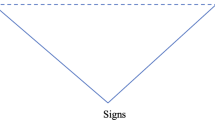Abstract
The authors of this study are teacher-researchers, the first is a university researcher and former third and fourth grade teacher, while the second author is a university-based science educator. They report findings from a community-based study that Ralph, the first author, and his students conducted across two academic years (2001–2003) in order to illustrate the ways in which the next generation science standards and learning progressions can be appropriated as social-constructed practices inside and outside of school. The authors argue that what constitutes science learning in school is not a ‘state of grace’ dictated by standards. Rather, becoming a scientist within a community of learners is a cultural phenomenon that teachers and students co-construct and as such teachers can approach the next generation science standards and learning progressions as opportunities to create intentional, disciplinary practice-based learning communities inside and outside of school.













Similar content being viewed by others
References
Bakhtin, M. M. (1986). The problem of speech genres(V. W. McGee, Trans.). In C. Emerson & M. Holmquist (Eds.), M.M. Bakhtin, speech genres and other late essays, (pp. 60–102). Austin: University of Texas Press.
Bloome, D., Carter, S. P., Christian, B. M., Otto, S., & Shuart-Faris, N. (2004). Discourse analysis and the study of classroom language and literacy events: A microethnographic perspective. London: Routledge.
Bloome, D., & Theodorou, E. (1988). Analyzing teacher–student and student–student discourse. In J. Green & J. Harker (Eds.), Multiple perspective analyses of classroom discourse (pp. 217–248). Norwood, NJ: Ablex.
Córdova, R. (2008). Writing and painting our lives into being: Learning to see learning in the transformative spaces between school and home. Language Arts, 86(1), 18–27.
Córdova, R., & Matthiesen, M. (2010). Reading, writing and mapping our worlds into Being: Shared inquiries into whose literacies count. The Reading Teacher, 63(6), 452–463.
Córdova, R., Kumpulainen, K., & Hudson, J. (2012). Nurturing creativity and professional learning for 21st century education: Responsive design and the cultural landscapes collaboratory. Learning Landscapes, 6(1), 157–180.
Córdova, R. A., Taylor, A., Hudson, J., Sellers, J., Pilgreen, J., Goetz, D., et al. (2014). Using responsive design as a shared approach to address the challenge of composing with digital tools. In R. Anderson & C. Mims (Eds.), Handbook of research on digital tools for writing instruction in K-12 settings (pp. 431–458). IGI Global.
Fairclough, N. (1992). Intertextuality in critical discourse analysis. Linguistics and Education, 4(3–4), 269–293. doi:10.1016/0898-5898(92)90004-G.
Frake, C. R. (1977). Plying frames can be dangerous: Some reflections on methodology in cognitive anthropology. Quarterly Newsletter of the Institute for Comparative Human Development, 3, 1–7.
Green, J., & Bloome, D. (1997). Ethnography and ethnographers of and in education: A situated perspective. In J. Flood, S. B. Heath, & D. Lapp (Eds.), Handbook for literacy educators: Research in the communicative and visual arts (pp. 181–202). NY: MacMillan.
Green, J. L., Dixon, C. N., & Zaharlick, A. (2003). Ethnography as a logic of inquiry. In J. Flood, D. Lapp, J. R. Squire, & J. M. Jensen (Eds.), Handbook of research on the teaching of the English language arts (2nd ed., pp. 201–224). Mahwah, NJ: Erlbaum.
Gumperz, J. J., & Cook-Gumperz, J. (1986). Interactional sociolinguistics in the study of schooling. In J. Cook-Gumperz (Ed.), The social construction of literacy (pp. 45–68). New York: Cambridge University Press. doi:10.1017/CBO9780511617454.004.
Ivanic, R. (1994). I is for interpersonal: Discoursal construction of writer identities and the teaching of writing. Linguistics and Education, 6(1), 3–15. doi:10.1016/08985898(94)90018-3.
Mohan, L., Chen, J., & Anderson, C. W. (2009). Developing a multi-year learning progression for carbon cycling in socio-ecological systems. Journal of Research in Science Teaching and Learning., 46(6), 675–698. doi:10.1002/tea.20314.
Moll, L. C., Amanti, C., Neff, D., & Gonzalez, N. (1992). Funds of knowledge for teaching: Using a qualitative approach to connect homes and classrooms. Theory into Practice, 31(2), 132–141. doi:10.1080/00405849209543534.
NGSS Lead States. (2013). Next generation science standards: For states, by states. Washington, DC: The National Academies Press.
Putney, L. G., Green, J., Dixon, C., Durdn, R., & Yeager, B. (2000). Consequential progressions: Exploring collective-individual development in a bilingual classroom. In C. Lee & P. Smagorinsky (Eds.), Vygotskian perspectives on literacy research: Constructing meaning through collaborative inquiry (pp. 86–126). New York: Cambridge University Press.
Reveles, J., Córdova, R., & Kelly, G. (2004). Science literacy and academic identity formulation. Journal of Research in Science Teaching, 41(10), 1111–1144. doi:10.1002/tea.20041.
Santa Barbara Classroom Discourse Group (Green, Dixon, Lin, Floriani, and Bradley). (1992). Constructing literacy in classrooms: Literate actions as social accomplishement. In H. Marshall (Ed.), Redefining student learning: Roots of educational change (pp. 119–150). Norwood, NJ: Ablex.
Smith, C., Wiser, M., Anderson, C., & Krajcik, J. (2006). Implications of research on children’s learning for standards and assessment: A proposed learning progression for matter and the atomic-molecular theory. Measurement, 14(1&2), 1–98.
Spradley, J. (1980). Participant observation. New York: HarcourtBrace.
Yeager, E., & Córdova, R. (2010). How knowledge counts: Families and their lived experiences as resources for academic and social action. In M. Dantas, & P. Manyak (Eds.), Home-school connections in a multicultural society: Learning from and with culturally and linguistically diverse families (pp. 218–236). London: Routledge.
Yeager, B., Floriani, A., & Green, J. (1998). Learning to see learning in the classroom: Developing an ethnographic perspective. In A. Egan-Robertson & D. Bloome (Eds.), Students as researchers of culture and language in their own communities (pp. 115–139). Cresskill, NJ: Hampton Press.
Author information
Authors and Affiliations
Corresponding author
Additional information
Lead Editor: J. Bazzul.
Rights and permissions
About this article
Cite this article
Córdova, R.A., Balcerzak, P. Co-constructing cultural landscapes for disciplinary learning in and out of school: the next generation science standards and learning progressions in action. Cult Stud of Sci Educ 11, 1223–1242 (2016). https://doi.org/10.1007/s11422-015-9678-4
Received:
Accepted:
Published:
Issue Date:
DOI: https://doi.org/10.1007/s11422-015-9678-4




